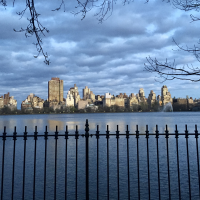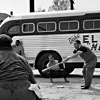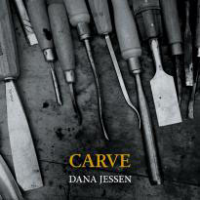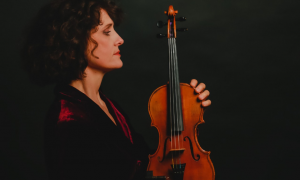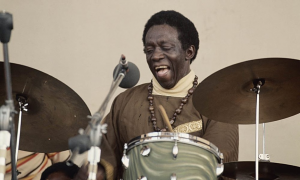Home » Jazz Articles » New York @ Night » Django A Gogo 2017 Music Festival
Django A Gogo 2017 Music Festival
Carnegie Hall
New York, NY
March 3, 2017
Stephane Wrembel, the France-born, Berklee-educated guitarist now based in New Jersey, produced the first Django A Gogo festival in 2004 as a single evening to pay homage to Django Reinhardt. Since then, the "Gypsy Jazz" style of the genius guitarist, composer, co-leader of the original Quintette du le Hot Club de France and progenitor of the genre, has continued to seep steadily across the cultural landscape. There are stringed instrument-based "Hot Clubs" of Philadelphia, Detroit, Chicago, San Francisco and numerous other American cities playing high-level interpretations of the repertoire to delighted audiences. A peak moment for the school of "Djangology" was Wrembel himself appearing at the 2012 Academy Awards to play his original composition, "Bistro Fada," the theme song for Woody Allen's Midnight in Paris.
A more recent high point for the music—and for Wrembel—came March 3. That day, Wrembel's Water Is Life label released two CDs, The Django Experiment I and The Django Experiment II, both recorded in April, 2016, and reviewed elsewhere on All About Jazz.
That evening, Wrembel's tenth edition of Django A Gogo captivated New York Carnegie Hall with two sets of Reinhardt and Reinhardt-influenced music played by a genre-stretching all-star cast of guests backed by Wrembel's regular band.
Carnegie Hall and Gypsy Jazz are two thoughts one may not connect—the venerable concert hall being thought of as home ground for tuxedoed classical music virtuosi, while thoughts of bright, energetic Gypsy swing may bring to mind a Left Bank cellar in Paris. But for decades, going back to the historic 1938 Benny Goodman concert—the hall's first jazz program and its first program to feature African American artists—Carnegie Hall has seen more than its share of adventurous programming. Ignoring the hall's burdensome new self-designation as Stern Auditorium/Perelman Stage, Django A Gogo raised the roof of the hallowed hall with two uplifting sets of music.
The first set opened with a beautiful solo piece by Wrembel called "Improvisation #1," before the large, beaming, pony-tailed Frenchman welcomed his band to the stage—Nick Anderson on drums, Thor Jensen on guitar, Ari Folman-Cohen on bass and Nick Driscoll on soprano sax—to play "Prometheus," another Wrembel composition. Wrembel's first guest of the evening was guitarist and vocalist David Gastine, a fellow Frenchman schooled in Django, who sang une chanson francaise, "Reverie." Wrembel's beautiful waltz from Midnight in Paris, "Bistro Fada," followed, and from that particularly Parisian moment the set took an unexpected detour out to the Colorado Rockies as Wrembel announced that Monsieur Gastine had always wanted to sing a John Denver song at Carnegie Hall. And so he did, belting out a fine, Gallic-inflected version of "Take Me Home, Country Roads"—to Denver fans in the audience, hearing the song sung at the fabled hall seemed to be "almost heaven."
The next guest to appear was Larry Keel, toting a steel string guitar that added flat picking to the band's gut-string guitar sound on "Troublant Bolero"—Jean "Django" Reinhardt meets Arthel "Doc" Watson! The great Gypsy guitarist Stochelo Rosenberg joined the festivities next for the Reinhardt-composed jazz standard, "Djangology" and "For Sephora," Rosenberg and Wrembel trading off thrilling, intricate, high-speed riffs and Keel tossing in exciting steel string runs of his own. More Rosenberg-Wrembel fireworks followed on "Blues Mineur," a master class in blowing up the limitations of Django guitar style.
Al Di Meola needed no introduction to the audience, receiving a warm welcome when he came on carrying not one but two beautiful acoustic guitars. Gracious and self-deprecating, the great jazz guitarist said the evening marked his first visit back to Carnegie Hall since he'd played there forty-one years ago with Chick Corea and Return to Forever—his first gig with the band. As Di Meola told the tale, he was nineteen and a sophomore at Berklee when he got the call from Corea asking him to come to New York that very night; young Al rushed out of Boston down to his parents' home in New Jersey and, when his father asked him what he was doing home, and the son told him the reason, Di Meola's father literally did not believe him.
After that hearty warm up came a brilliant and difficult solo improvisation by Di Meola—less Django Reinhardt, more John McLaughlin-Al Di Meola acoustic jazz guitar—which was well received by both audience and fellow band members. The set closed with the full band joining in on two Django-penned jazz standards, "Nuages," the tune that was adopted as the underground anthem of the French Resistance during World War II, and the rollicking, ubiquitous "Minor Swing."
Set two started with Rosenberg and Wrembel joining Di Meola on the latter's "Mediterranean Sundance," the trio tackling the great tune like a Gypsy-fueled version of McLaughlin-Di Meola-Paco de Lucia. The same feeling emerged on the next tune, Chick Corea's classic "Spain," given here a strong, meditative treatment.
The remarkable Stochelo Rosenberg was featured again on "Double Jeu," a staple of his own trio's repetoire and a tune he has performed sensationally with Bireli Lagrene in concert. On the lovely waltz, "Indifference," Nick Driscoll's sax ably replaced the perhaps more traditional-sounding violin-accordion arrangement with a modern jazz sound all his own. The final tunes of the evening saw Ryan Montbleau coming on to sing "Georgia On My Mind," "It Don't Mean A Thing (If It Ain't Got That Swing)" and "Dark Eyes," delivering the tunes in appropriately 1930's crooner style. By the last note, the delighted audience was on its feet drenching the stage with appreciative applause.
The Django Reinhardt story is well-known but may be worth recounting briefly on the occasion of Wrembel's achievements. Born in 1910 in a caravan outside the Belgian town of Liberchies to a family of itinerant Romani—known colloquially as Gypsies—Reinhardt grew up in the Romani guitar-based musical culture, became proficient on several stringed instruments and, by the age of twelve, was playing cabaret gigs. At eighteen, the wagon he lived in caught fire and Reinhardt suffered terrible burns as a result. With full use of only the thumb, middle, and index fingers of his left hand, Reinhardt invented a new way to play guitar- —wide-ranging, radical movement on the fret board coupled with flurry after flurry of flat-picked notes. He moved to Paris in the 1930s, and, with violinist Stephane Grappelli and guitarist brother Joseph Reinhardt, formed the great Quintette. The group's swinging fusion of American jazz, Gypsy rhythms, and Parisian street singing became hugely popular around the world, and the genre that came to be known as Gypsy Jazz was born -celebrated and preserved to this day by Django- style guitarists everywhere.
Wrembel has stated that his goal in producing the annual Django A Gogo festival—and the week of guitar camps he runs along with it—is to stretch the Gypsy Jazz genre's boundaries and explore and extend its possibilities. He is aware that the danger with musical genres is that the noble desire to faithfully preserve and repeat the styles of the originators can inhibit rather than inspire creative impulses, leading to staleness, and worse. With the 2017 edition of the festival breathing much fresh stylistic air into the music thanks to the dynamic playing of Al Di Meola, Stochelo Rosenberg, Larry Keel, and Stephane Wrembel himself, it's safe to say Monsieur Wrembel is achieving his goal. Django A Gogo is currently touring the Northeast and Midwest, making stops in Chicago, Detroit, Madison (WI), Syracuse, Easton (PA), and Beacon (NY).
The All-Star Band: Stephane Wrembel, acoustic guitar; Al Di Meola, acoustic guitars; Stochelo Rosenberg, acoustic guitar; Larry Keel, acoustic guitar; Thor Jensen, acoustic guitar; David Gastine, acoustic guitar and vocals; Ryan Montbleau, vocals and acoustic guitar; Nick Driscoll, soprano saxophone; Ari Folman-Cohen, bass; Nick Anderson, drums.
Tags
STEPHANE WREMBEL
New York @ Night
Peter Jurew
Michelle Roche Media Relations
United States
New York
New York City
Django Reinhardt
Woody Allen
Benny Goodman
Nick Anderson
Ari Folman-Cohen
Stochelo Rosenberg
Al Di Meola
Chick Corea
Return To Forever
john mclaughlin
Paco de Lucia
Bireli Lagrene
Ryan Montbleau
Stephane Grappelli
Joseph Reinhardt
Chicago
Detroit
Madison
Syracuse
Easton
Beacon
Comments
About Stephane Wrembel
Instrument: Guitar
Related Articles | Concerts | Albums | Photos | Similar ToPREVIOUS / NEXT
Stephane Wrembel Concerts
Support All About Jazz
 All About Jazz has been a pillar of jazz since 1995, championing it as an art form and, more importantly, supporting the musicians who make it. Our enduring commitment has made "AAJ" one of the most culturally important websites of its kind, read by hundreds of thousands of fans, musicians and industry figures every month.
All About Jazz has been a pillar of jazz since 1995, championing it as an art form and, more importantly, supporting the musicians who make it. Our enduring commitment has made "AAJ" one of the most culturally important websites of its kind, read by hundreds of thousands of fans, musicians and industry figures every month.

